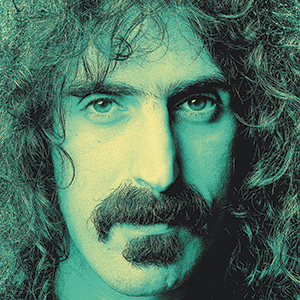

Like most cranks, Frank Zappa was pissed off by a rainbow of things. The passivity of his fellow American citizens upset him just as much as the invention of expensive designer jeans. Thorsten Schutte’s documentary, Eat That Question: Frank Zappa in His Own Words, is a collage of Zappa (1940-92) enduring his least-favorite activity—being interviewed.
Zappa called interviews “the most abnormal thing you can do to a person.” He’s prickly, occasionally seething, as yet another journalist butters Zappa up for the camera with comments about how loved and hated he is. Ostensibly trying to charm the musician responsible for some 60 albums, one newsman reads a description from Time magazine calling Zappa “bearded and gross and filthy.”
Scatological, absolutely. Thousands of bathrooms in the 1960s had the poster of the man naked on the toilet: Zappa on the crappa. Zappa thought of himself as ugly, and said so, right up to the final interview he did for television. This, despite the lean physique, the soulful brown eyes, the trademark mustache and soul patch, and the Rudolph Valentino-ish nose. Of course, Zappa answered his own musical question, “What is the Ugliest Part of Your Body?” with this answer: “your mind.”
Zappa received more attention for novelty songs about yellow snow and stinky feet than he did for his Edgar Varese-inspired jazz-classical orchestral compositions. He always lowballed highbrow music. Like Liberace segueing Liszt into “Three Little Fishies,” Zappa and his cohorts could interject “The Teddy Bears’ Picnic” into free jazz, with a chorus of vocalists retching theatrically.
The young Zappa was devastating; his album with The Mothers of Invention, We’re Only In It For the Money savaged one of the few universally sacred pop works of the time, The Beatles’ Sergeant Pepper’s Lonely Hearts Club Band. He also went after “Hey Joe” and “Louie, Louie” as banalities of the 1960s.
Considering this film’s discussion of Zappa’s attempts to play the Albert Hall, it’s a pity there’s no footage of the moment he played the “Louie, Louie” riff on the Albert Hall Festival Organ, at a volume loud enough to deafen London.
Sometimes, the only way to date the concert footage here is to see what hair and clothes styles the backup band is wearing. Seeing Zappa live makes one want to challenge Schutte’s in-his-own-words structure—it would be good to hear something enlightening from Zappa’s band members. Potential interviewees could include percussionist Ruth Underwood, whose xylophones added so much merriment to Zappa’s best work. “St. Alphonso’s Pancake Breakfast” without Underwood would be like those “saintly pancakes” without syrup. Similarly, it would be good to hear from Mark Volman and Howard Kaylan (aka Flo and Eddie), who brought such lively humor and expert doo-wop vocals to Zappa’s sound.
Much of Eat That Question is about Zappa’s life-long fight against censorship. For inane reasons, MGM records cut Zappa’s oddly nostalgic song about Southern California’s Inland Empire, “Let’s Make the Water Turn Black.” In the 1980s, Zappa was in suit and tie, testifying at the Senate’s record-rating hearings; the stroke-addled Florida senator Paula Hawkins grills Zappa about what sort of toys his kids had at home.
Schutte argues that Zappa was always better respected in Europe than America—the proof is in the presidential reception Zappa got in the Czech Republic. Less known is Zappa’s work as a technical pioneer. He explains to the camera how to use a Synclavier—a 16-bit, magnetic disk sampler—many years before every home had an electronic keyboard. Rarely is Zappa’s movie 200 Motels (1971) credited as one of the earliest feature films shot on video tape.
The Zappa estate approved this documentary, and so the man’s private life stays out of bounds—we must take his word that offstage he was a married family man with a mortgage. Uninterested in dissipation, Zappa cared nothing for any drug stronger than nicotine. He fell early, not from an OD or a blown liver, but from prostate cancer. The movie is the puzzle of a hardworking and even morose figure, drawn irresistibly to silliness.
Eat That Question: Frank Zappa in His Own Words
R; 90 Mins.
Camera Cinemas



